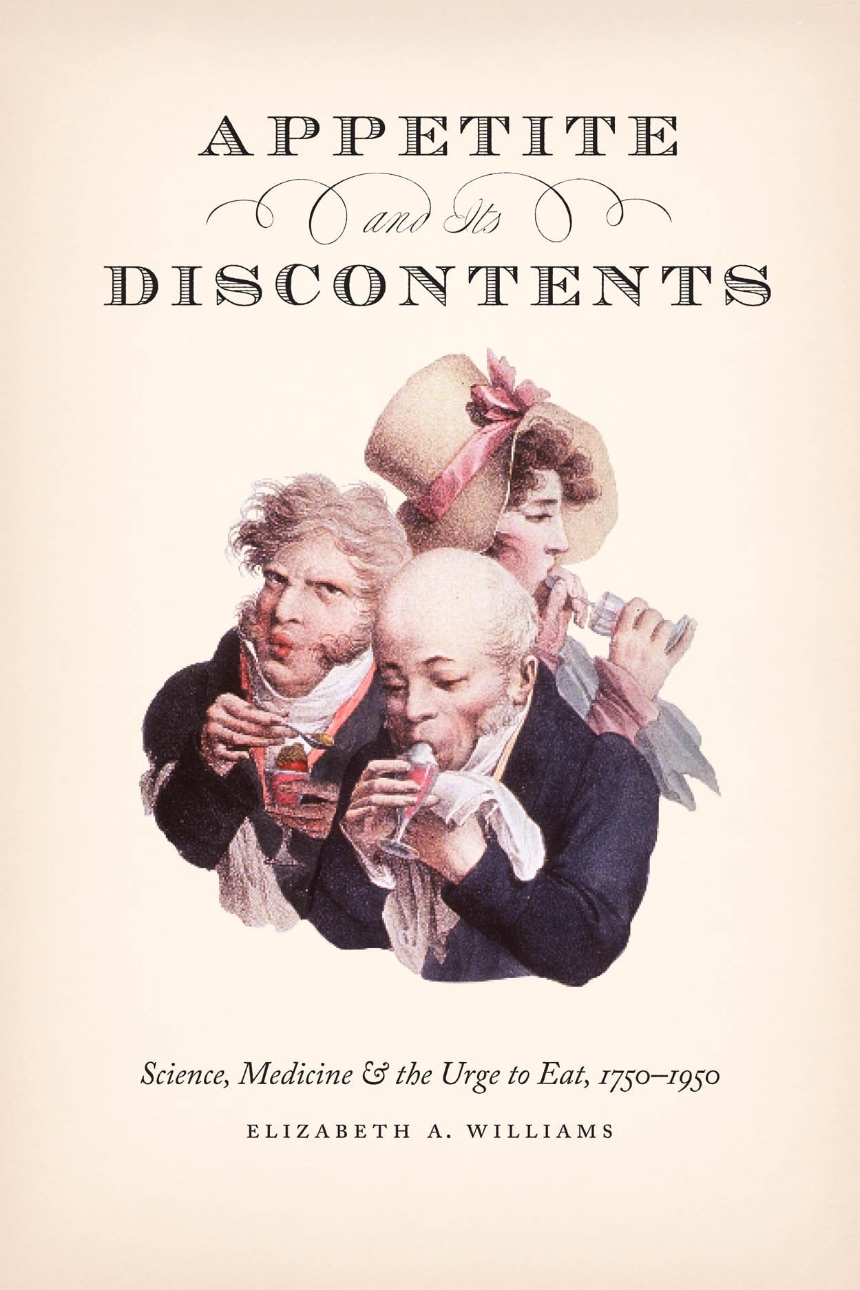Appetite and Its Discontents
Science, Medicine, and the Urge to Eat, 1750-1950
9780226693040
9780226692999
9780226693187
Appetite and Its Discontents
Science, Medicine, and the Urge to Eat, 1750-1950
Why do we eat? Is it instinct? Despite the necessity of food, anxieties about what and how to eat are widespread and persistent. In Appetite and Its Discontents, Elizabeth A. Williams explores contemporary worries about eating through the lens of science and medicine to show us how appetite—once a matter of personal inclination—became an object of science.
Williams charts the history of inquiry into appetite between 1750 and 1950, as scientific and medical concepts of appetite shifted alongside developments in physiology, natural history, psychology, and ethology. She shows how, in the eighteenth century, trust in appetite was undermined when researchers who investigated ingestion and digestion began claiming that science alone could say which ways of eating were healthy and which were not. She goes on to trace nineteenth- and twentieth-century conflicts over the nature of appetite between mechanists and vitalists, experimentalists and bedside physicians, and localists and holists, illuminating struggles that have never been resolved. By exploring the core disciplines in investigations in appetite and eating, Williams reframes the way we think about food, nutrition, and the nature of health itself..
Williams charts the history of inquiry into appetite between 1750 and 1950, as scientific and medical concepts of appetite shifted alongside developments in physiology, natural history, psychology, and ethology. She shows how, in the eighteenth century, trust in appetite was undermined when researchers who investigated ingestion and digestion began claiming that science alone could say which ways of eating were healthy and which were not. She goes on to trace nineteenth- and twentieth-century conflicts over the nature of appetite between mechanists and vitalists, experimentalists and bedside physicians, and localists and holists, illuminating struggles that have never been resolved. By exploring the core disciplines in investigations in appetite and eating, Williams reframes the way we think about food, nutrition, and the nature of health itself..
Reviews
Table of Contents
List of Illustrations
Introduction
Part One Anxieties of Appetite: Created Needs in the Enlightenment, 1750–1800
Introduction to Part One
1 Why We Eat: The Ancient Legacy
2 “False or Defective” Appetite in the Medical Enlightenment
3 Human and Animal Appetite in Natural History and Physiology
Part Two The Elusiveness of Appetite: Laboratory and Clinic, 1800–1850
Introduction to Part Two
4 Perils and Pleasures of Appetite at 1800: Xavier Bichat and Erasmus Darwin
5 The Physiology of Appetite to 1850
6 Extremes and Perplexities of Appetite in Clinical Medicine
Part Three Intelligent or “Blind and Unconscious”? Appetite, 1850–1900
Introduction to Part Three
7 The Drive to Eat in Nutritional Physiology
8 The Psychology of Ingestion: Appetite in Physiological and Animal Psychology
9 Peripheral or Central? Disordered Eating in Clinical Medicine
Part Four Appetite as a Scientific Object, 1900–1950
Introduction to Part Four
10 Psyche, Nerves, and Hormones in the Physiology of Ingestion
11 Appetite and the Nature-Nurture Divide: Eating Behavior in Psychology and Ethology
12 Somatic, Psychic, Psychosomatic: The Medicine of Troubled Appetite
Epilogue: Appetite after 1950
Acknowledgments
List of Abbreviations
Notes
Bibliography
Index
Introduction
Part One Anxieties of Appetite: Created Needs in the Enlightenment, 1750–1800
Introduction to Part One
1 Why We Eat: The Ancient Legacy
2 “False or Defective” Appetite in the Medical Enlightenment
3 Human and Animal Appetite in Natural History and Physiology
Part Two The Elusiveness of Appetite: Laboratory and Clinic, 1800–1850
Introduction to Part Two
4 Perils and Pleasures of Appetite at 1800: Xavier Bichat and Erasmus Darwin
5 The Physiology of Appetite to 1850
6 Extremes and Perplexities of Appetite in Clinical Medicine
Part Three Intelligent or “Blind and Unconscious”? Appetite, 1850–1900
Introduction to Part Three
7 The Drive to Eat in Nutritional Physiology
8 The Psychology of Ingestion: Appetite in Physiological and Animal Psychology
9 Peripheral or Central? Disordered Eating in Clinical Medicine
Part Four Appetite as a Scientific Object, 1900–1950
Introduction to Part Four
10 Psyche, Nerves, and Hormones in the Physiology of Ingestion
11 Appetite and the Nature-Nurture Divide: Eating Behavior in Psychology and Ethology
12 Somatic, Psychic, Psychosomatic: The Medicine of Troubled Appetite
Epilogue: Appetite after 1950
Acknowledgments
List of Abbreviations
Notes
Bibliography
Index
